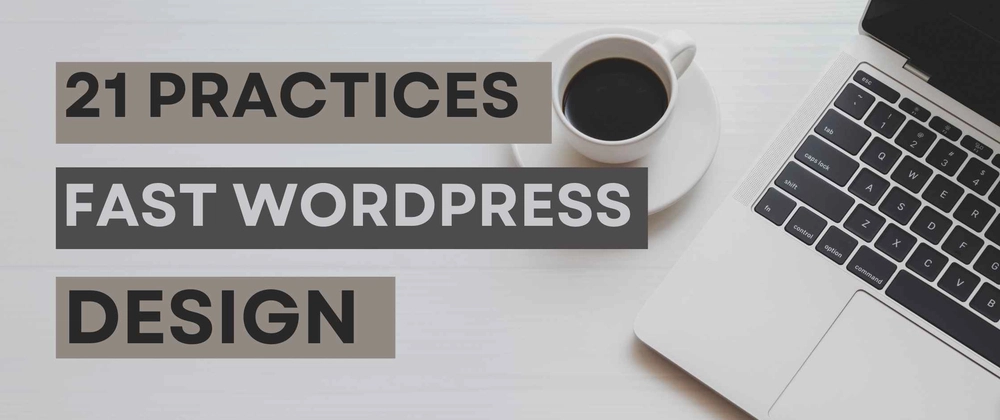21 Best Practices for Fast WordPress Site Creation

A fast WordPress website improves user experience, boosts SEO rankings, and increases conversions. Slow websites can drive visitors away and reduce engagement. This guide covers the best practices for creating a high-speed WordPress site, ensuring optimal performance from the start.
What Slows Down a WordPress Website? Several factors contribute to slow website speed. Heavy themes, unoptimized images, and too many plugins can increase load times. Poor hosting and lack of caching also negatively impact performance. Identifying and fixing these issues is essential for maintaining speed.
Choosing the Right Foundation for a Fast WordPress Site
1. Selecting a High-Performance WordPress Hosting Provider The right hosting provider plays a significant role in site speed. Managed WordPress hosting offers optimized servers for better performance. Popular options include Cloudways, Kinsta, and WP Engine. VPS and dedicated hosting provide more control and faster speeds compared to shared hosting.
**2. Picking a Lightweight & Speed-Optimized Theme ** Heavy themes with excessive features slow down websites. Choosing a lightweight theme like Astra, GeneratePress, or Kadence ensures faster load times. Testing a theme’s speed before installation helps prevent performance issues.
3. Essential WordPress Settings for Speed Optimization Disabling unnecessary features reduces load time. Turning off emojis, embeds, and XML-RPC can improve speed. Limiting post revisions and controlling auto-saves prevent database bloat.
4. Using a Caching Plugin for Faster Load Times Caching reduces server load and speeds up content delivery. Popular caching plugins include WP Rocket, LiteSpeed Cache, and W3 Total Cache. Configuring these properly ensures efficient caching and performance improvements. I used WP Rocket and perfmatters plugins for one of my sites and results are amazing growinstaup.com
5. Optimizing Images for Speed Without Losing Quality Large image files slow down websites. Image compression plugins like ShortPixel, Imagify, and Smush reduce file size without quality loss. Using WebP format and enabling lazy loading further improves performance.
6. Using a Content Delivery Network (CDN) for Faster Global Access A CDN stores copies of website content across multiple servers worldwide. Cloudflare, BunnyCDN, and KeyCDN help deliver content faster to visitors. Implementing a CDN reduces latency and improves load times.
7. Minifying & Combining CSS, JavaScript, and HTML Minification removes unnecessary code, reducing file size. Plugins like Autoptimize and WP Rocket simplify this process. Combining CSS and JavaScript files also helps in reducing HTTP requests.
8. Reducing HTTP Requests for Faster Page Loading Every external script increases page load time. Removing unnecessary third-party resources, such as fonts and widgets, optimizes performance. Reducing ads and social media embeds also improves speed.
9. Optimizing the WordPress Database for Faster Performance A cluttered database affects site speed. Cleaning up post revisions, spam comments, and transients improves database efficiency. WP-Optimize and Perfmatters automate this process, ensuring smoother performance.
Advanced Techniques for Maximum WordPress Speed
10. Using a Lightweight Page Builder (or Avoiding It Altogether) Page builders add extra code that slows down websites. Using Gutenberg or lightweight alternatives like Oxygen and Bricks keeps pages fast. Reducing dependency on page builders improves overall site speed.
11. Enabling Gzip or Brotli Compression Compression reduces the size of website files, improving load speed. Enabling Gzip or Brotli compression via .htaccess or plugins helps transfer data faster. This reduces bandwidth usage and enhances performance.
12. Implementing Critical CSS and Async Loading Critical CSS prioritizes loading important styles first. Async loading defers unnecessary scripts to improve rendering speed. Plugins like WP Rocket automate these processes for better performance.
13. Upgrading to the Latest PHP Version PHP versions impact website speed and security. Updating to the latest stable PHP version reduces execution time. Most hosting providers allow easy PHP upgrades via control panels.
14. Removing Unused Plugins and Scripts Excess plugins slow down websites by adding extra requests. Regularly auditing and removing unnecessary plugins improves efficiency. Using lightweight alternatives reduces the need for multiple plugins.
Mobile Optimization for Faster WordPress Sites
15. Why Mobile Speed Matters More Than Ever Google prioritizes mobile performance in rankings. Optimizing for mobile users improves SEO and user experience. Testing with Google PageSpeed Insights helps identify mobile speed issues.
16. AMP (Accelerated Mobile Pages) – Should You Use It? AMP removes unnecessary elements for faster mobile loading. It benefits content-heavy sites but may limit design flexibility. Weighing the pros and cons helps determine if AMP is suitable.
17. Reducing Mobile Redirects & Optimizing Touch Elements Unnecessary redirects slow down mobile sites. Minimizing redirects and optimizing touch elements improve usability. Ensuring clickable elements are properly spaced enhances mobile experience.
Measuring & Maintaining WordPress Speed
18. How to Regularly Monitor WordPress Performance Regular speed tests help maintain performance. Tools like GTmetrix, Lighthouse, and WebPageTest provide insights. Monitoring load times ensures consistent speed optimization.
19. Automating Speed Optimization with Scheduled Maintenance Automating maintenance prevents performance drops. Setting up scheduled database cleanups and updates improves efficiency. Regular backups ensure security while maintaining speed.
Future-Proofing Your WordPress Website for Speed
20. Preparing for Google’s Next Algorithm Updates Google continuously updates ranking factors. Keeping up with Core Web Vitals ensures long-term performance. Adapting to algorithm changes maintains SEO rankings.
21. AI and WordPress Performance Optimization AI-based tools optimize website speed with minimal effort. Plugins like NitroPack and WP Compress AI automate performance improvements. Implementing AI-driven solutions enhances long-term site efficiency.
Conclusion Building a fast WordPress site requires proper hosting, lightweight themes, caching, and database optimization. Regular monitoring and implementing advanced techniques ensure long-term performance. Applying these best practices will keep your website fast, user-friendly, and SEO-optimized.
